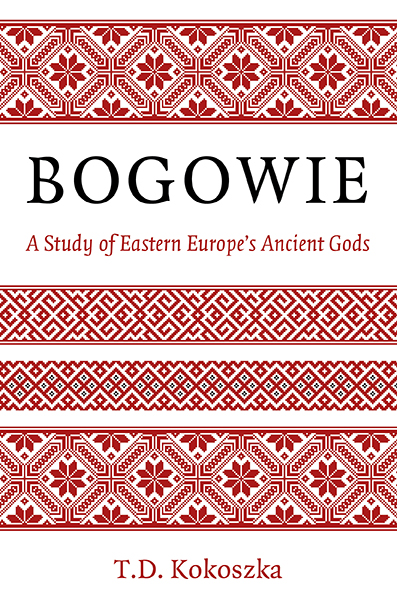Bogowie
An earnest and careful analysis of East European folklore, history, and mythology, and a credible summary of Slavic paganism.

An earnest and careful analysis of East European folklore, history, and mythology, and a credible summary of Slavic paganism.
An earnest and careful analysis of East European folklore, history, and mythology, and a credible summary of Slavic paganism.
Eastern, Paganism & neo-paganism, Religious
T.D. Kokoszka grew up in Texas with a Jewish mother and a Polish-American father. While he was aware of roots going back to Eastern Europe from both families, he found it hard to learn very much about them. He knew that Polish people would whack one another with palm leaves around Easter, and he knew that his great-grandmother purportedly believed in forest spirits known as borowy. However, it wasn't until he was in his teens that he became vaguely aware of an ancient people known as the Slavs who gave rise to the Polish, Ukrainian, Russian, Serbian, Bulgarian, Slovakian, Slovene, and Czech languages. It quickly became clear to him that this was a family of cultures currently under-represented in popular culture, and even in western scholarship.
Not simply a regurgitation of scholarship from the Soviet period - and presenting new analyses by using previously neglected resources - Bogowie: A Study of Eastern Europe's Ancient Gods offers one of the most painstaking scholarly reconstructions of Slavic paganism. These new resources include not only an overview of folklore from many different Slavic countries but also comparisons with Ossetian culture and Mordvin culture, as well as a series of Slavic folktales that Kokoszka analyzes in depth, often making the case that the narratives involved are mythological and shockingly ancient. Readers will recognize many European folktale types and possibly learn to look at these folktales differently after reading this book.
Click on the circles below to see more reviews
Rating: 4 out of 5 stars. As someone with an Eastern European heritage I was familiar with the basic shapes of most of these stories, but definitely not in the depth that they are portrayed here. It really is heavy on religion, and while the author does try to stay objective, sometimes it is not successful., but all the deep dives are very interesting and I do not think the bit of personal colouring you find in this book is to its detriment, it brings the text that otherwise could be a bit dry closer to the reader. I always feel a bit squeamish about saying that a book is "well researched" or similar, only because I do not posses the skill set to determine such, but the author is definitely knowledgeable on and enthusiastic about the topic and the text reads quite academic. Personally my favourite bits were the linguistic sections, and all in all I enjoyed the book a lot. ~ Virág Kulcsár (Reviewer) , NetGalley
Rating: 5 out of 5 stars. As a Polish American I found the history and research very fascinating. The author made many important points about Slavic culture and its dismissal or lack of representation. I enjoyed the many linguistic connections to India and the Balkans, having many friends from those countries, I have noticed those connections. The folklore and traditions are truly beautiful and it brought back many memories of growing up in Poland. ~ Weronika Pogorecka (Reviewer), NetGalley
Rating: 4 out of 5 stars. Well put together and obviously the effort of a great deal of care and passion for the subject. I want to look more at this when I have the time to truly learn something from it. Certainly seems like it hits the nail on the head for being a nonfiction resource for an area that has become a hotbed of global interest of late. ~ Rayne Rickrode (Bookseller) , NetGalley
English: It is impossible to go into all the themes mentioned in a book review. The book is a treasure trove of interesting references and hints, cleverly written and arousing curiosity for more. German: Unmöglich kann man im Rahmen einer Buchbesprechung auf alle angerissenen Themen eingehen. Das Buch ist eine Fundgrube an interessanten Ver- und Hinweisen, klug geschrieben und auf mehr neugierig machend. ~ Hermann Ritter of Eldaring Inclusive Heathenry, https://inclusiveheathenry.com/inclusive-groups/eldaring-ev
The author has a fascinating ability to weave facts and folklore into a cohesive and interesting tapestry of very palatable information. His research and work is evident in this long awaited discovery for me. I've been searching for years to discover more of my Slavic heritage in relation to my pagan leanings. Rev. Pam Desjardine ~ Pam Desjardine- Parent, Author, Legion Chaplain, Mystic Shamanenka/Eclectic Pagan in Kelowna, B.C., Canada, https://books.google.ca/books?id=LhZrzwEACAAJ&sitesec=reviews&hl=en
I'm very impressed, and a little humbled. The book shows a skill and an ability to deal with sources that I would be pleased to possess myself- a wonderful book. I wish I'd had the space for as much evidence as it gives, and the skill handling it which (the author) shows. I'll certainly be reading the whole thing, and hope that it gets published. ~ David Fickett-Wilbar (Ceisiwr Serith) Author of The Big Book of Pagan Prayer and Ritual
Very important for the subject of Slavic paganism. ~ Leonni Moura, Author of Cailleach Devocionário Pagão
T.D. Kokoszka’s book provides a needed look at the underlying commonalities of Slavic beliefs without the distortions of nationalistic rhetoric. Kokoszka has a strong foundation in biology and writes knowledgeably about the movement of early tribes in this region and DNA studies. He weaves together samples of folk tales along with well-laid out explanations of the Pagan beliefs found in them. It was wonderful to see how each of us coming from completely different research angles came to so many of the same conclusions. For those trying to grasp more of their Slavic ancestral beliefs, I would whole-heartedly recommend this book! ~ Patricia Woodruff Ph.D., author of Woodruffs guide to Slavic deities